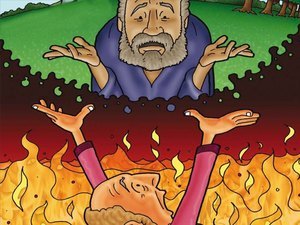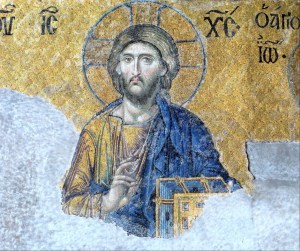Lillie Ammann's Blog, page 42
March 3, 2018
Devotion for the Third Sunday in Lent

So He came to a city of Samaria called Sychar, near the parcel of ground that Jacob gave to his son Joseph; and Jacob’s well was there. So Jesus, being wearied from His journey, was sitting thus by the well. It was about the sixth hour.
There came a woman of Samaria to draw water. Jesus said to her, “Give Me a drink.” For His disciples had gone away into the city to buy food. Therefore the Samaritan woman said to Him, “How is it that You, being a Jew, ask me for a drink since I am a Samaritan woman?” (For Jews have no dealings with Samaritans.) Jesus answered and said to her, “If you knew the gift of God, and who it is who says to you, ‘Give Me a drink,’ you would have asked Him, and He would have given you living water.” She said to Him, “Sir, You have nothing to draw with and the well is deep; where then do You get that living water? You are not greater than our father Jacob, are You, who gave us the well, and drank of it himself and his sons and his cattle?” Jesus answered and said to her, “Everyone who drinks of this water will thirst again; but whoever drinks of the water that I will give him shall never thirst; but the water that I will give him will become in him a well of water springing up to eternal life.”
The woman said to Him, “Sir, give me this water, so I will not be thirsty nor come all the way here to draw.” He said to her, “Go, call your husband and come here.” The woman answered and said, “I have no husband.” Jesus said to her, “You have correctly said, ‘I have no husband’; for you have had five husbands, and the one whom you now have is not your husband; this you have said truly.” The woman said to Him, “Sir, I perceive that You are a prophet. Our fathers worshiped in this mountain, and you people say that in Jerusalem is the place where men ought to worship.” Jesus said to her, “Woman, believe Me, an hour is coming when neither in this mountain nor in Jerusalem will you worship the Father. You worship what you do not know; we worship what we know, for salvation is from the Jews. But an hour is coming, and now is, when the true worshipers will worship the Father in spirit and truth; for such people the Father seeks to be His worshipers. God is spirit, and those who worship Him must worship in spirit and truth.” The woman said to Him, “I know that Messiah is coming (He who is called Christ); when that One comes, He will declare all things to us.” Jesus said to her, “I who speak to you am He.”
At this point His disciples came, and they were amazed that He had been speaking with a woman, yet no one said, “What do You seek?” or, “Why do You speak with her?” So the woman left her waterpot, and went into the city and said to the men, “Come, see a man who told me all the things that I have done; this is not the Christ, is it?” They went out of the city, and were coming to Him.
Meanwhile the disciples were urging Him, saying, “Rabbi, eat.” But He said to them, “I have food to eat that you do not know about.” So the disciples were saying to one another, “No one brought Him anything to eat, did he?” Jesus said to them, “My food is to do the will of Him who sent Me and to accomplish His work. Do you not say, ‘There are yet four months, and then comes the harvest’? Behold, I say to you, lift up your eyes and look on the fields, that they are white for harvest. Already he who reaps is receiving wages and is gathering fruit for life eternal; so that he who sows and he who reaps may rejoice together. For in this case the saying is true, ‘One sows and another reaps.’ I sent you to reap that for which you have not labored; others have labored and you have entered into their labor.”
From that city many of the Samaritans believed in Him because of the word of the woman who testified, “He told me all the things that I have done.” So when the Samaritans came to Jesus, they were asking Him to stay with them; and He stayed there two days. Many more believed because of His word; and they were saying to the woman, “It is no longer because of what you said that we believe, for we have heard for ourselves and know that this One is indeed the Savior of the world.” ~ John 4:5-42
For Jesus to talk to the Samarian woman was out of the ordinary, as Jews and Samaritans didn’t associate with each other. Even more surprising to her, He knew about her immoral lifestyle. Instead of denying her sin, she ran and told the people of the town about Jesus. They came out to the well to hear what He had to say, and Jesus stayed there for two days. As a result, many of the townspeople became believers. If we were taking the Gospel to an unfriendly community, most of us would look for someone who led a more moral life, someone who had the respect of the people, someone with influence. But Jesus worked through this sinful, outcast woman, as He often works through the least likely people to accomplish His purposes.
Thank You, Lord, that You use sinners, outcasts, weak people. That means You can use me. I can tell my story of knowing You and impact other people, even though I am not influential. Use me, Lord, as You see fit. In the name of Jesus Christ. Amen.
Devotion for Saturday after the Second Sunday in Lent

Now all the tax collectors and the sinners were coming near Him to listen to Him. Both the Pharisees and the scribes began to grumble, saying, “This man receives sinners and eats with them.”
And He said, “A man had two sons. The younger of them said to his father, ‘Father, give me the share of the estate that falls to me.’ So he divided his wealth between them. And not many days later, the younger son gathered everything together and went on a journey into a distant country, and there he squandered his estate with loose living. Now when he had spent everything, a severe famine occurred in that country, and he began to be impoverished. So he went and hired himself out to one of the citizens of that country, and he sent him into his fields to feed swine. And he would have gladly filled his stomach with the pods that the swine were eating, and no one was giving anything to him. But when he came to his senses, he said, ‘How many of my father’s hired men have more than enough bread, but I am dying here with hunger! I will get up and go to my father, and will say to him, “Father, I have sinned against heaven, and in your sight; I am no longer worthy to be called your son; make me as one of your hired men.”’ So he got up and came to his father. But while he was still a long way off, his father saw him and felt compassion for him, and ran and embraced him and kissed him. And the son said to him, ‘Father, I have sinned against heaven and in your sight; I am no longer worthy to be called your son.’ But the father said to his slaves, ‘Quickly bring out the best robe and put it on him, and put a ring on his hand and sandals on his feet; and bring the fattened calf, kill it, and let us eat and celebrate; for this son of mine was dead and has come to life again; he was lost and has been found.’ And they began to celebrate.
“Now his older son was in the field, and when he came and approached the house, he heard music and dancing. And he summoned one of the servants and began inquiring what these things could be. And he said to him, ‘Your brother has come, and your father has killed the fattened calf because he has received him back safe and sound.’ But he became angry and was not willing to go in; and his father came out and began pleading with him. But he answered and said to his father, ‘Look! For so many years I have been serving you and I have never neglected a command of yours; and yet you have never given me a young goat, so that I might celebrate with my friends; but when this son of yours came, who has devoured your wealth with prostitutes, you killed the fattened calf for him.’ And he said to him, ‘Son, you have always been with me, and all that is mine is yours. But we had to celebrate and rejoice, for this brother of yours was dead and has begun to live, and was lost and has been found.’” ~ Luke 15:1-3, 11-32
We are all so familiar with the story of the Prodigal Son that’s it’s easy to take it for granted. But I am struck by the response of the older son, the one who stayed home to work with his father while his younger brother was off squandering half of his father’s estate—while his father was still alive. Unfortunately, I see myself in this self-righteous, jealous son. After all, he had been faithful and loyal to his father, had done all the right things—and now his wastrel brother was getting all the attention and being showered with love and gifts from their father. Instead of resentment, he should have felt joy that his brother was safely home. The evil person who repents on his deathbed will be in Heaven with Jesus, with rejoicing from all the heavenly host for his salvation, late as it was. He won’t have to pay for all his evil deeds because Jesus’ atonement on the cross paid for them all, just as His death paid for every bit of evil I have done in my life. Even though I’ve been a Christian my entire life, the person who waited until moments before he was headed for hell to turn his life to God will be right beside me throughout eternity. That gives me hope for people in my life who have still not accepted Jesus—they can still be saved.
Thank You, Lord, that as long as there is breath, there is hope for salvation. Give me a heart for the unsaved and fill me with Your words and actions to share Your Gospel with those who need to hear it. In the name of Jesus Christ. Amen.
March 1, 2018
Devotion for Friday after the Second Sunday in Lent
“Listen to another parable. There was a landowner who planted a vineyard and put a wall around it and dug a wine press in it, and built a tower, and rented it out to vine-growers and went on a journey. When the harvest time approached, he sent his slaves to the vine-growers to receive his produce. The vine-growers took his slaves and beat one, and killed another, and stoned a third. Again he sent another group of slaves larger than the first; and they did the same thing to them. But afterward he sent his son to them, saying, ‘They will respect my son.’ But when the vine-growers saw the son, they said among themselves, ‘This is the heir; come, let us kill him and seize his inheritance.’ They took him, and threw him out of the vineyard and killed him. Therefore when the owner of the vineyard comes, what will he do to those vine-growers?” They said to Him, “He will bring those wretches to a wretched end, and will rent out the vineyard to other vine-growers who will pay him the proceeds at the proper seasons.”
Jesus said to them, “Did you never read in the Scriptures,
‘The stone which the builders rejected,
This became the chief corner stone;
This came about from the Lord,
And it is marvelous in our eyes’?
Therefore I say to you, the kingdom of God will be taken away from you and given to a people, producing the fruit of it. And he who falls on this stone will be broken to pieces; but on whomever it falls, it will scatter him like dust.”
When the chief priests and the Pharisees heard His parables, they understood that He was speaking about them. When they sought to seize Him, they feared the people, because they considered Him to be a prophet. ~ Matthew 21:33-46
God sent the prophets to His people, but they rejected them and treated them badly. Then He sent Jesus, His only Son, but He was treated even worse than the prophets. Yet in spite of experiencing a horrible death at the hands of those He came to save, Jesus rose again and has become the chief cornerstone of His Church, His Body. In His death, He took on the sins of the world—past, present, and future. Each of us is one of the killers of Jesus, because it was our sins that put Him on that cross.
Lord God, forgive me for my part in Jesus’ death. He took on my sins and died for them. He would have done that if I was the only sinner in the world, and my sins were the only ones that needed to be atoned for. I can point fingers at the Romans who crucified Him and the Jews who condemned Him, but my sins caused Him to die. Empower me by the Holy Spirit to live for Him. In His name. Amen.
February 28, 2018
Devotion for Thursday after the Second Sunday in Lent

“Now there was a rich man, and he habitually dressed in purple and fine linen, joyously living in splendor every day. And a poor man named Lazarus was laid at his gate, covered with sores, and longing to be fed with the crumbs which were falling from the rich man’s table; besides, even the dogs were coming and licking his sores. Now the poor man died and was carried away by the angels to Abraham’s bosom; and the rich man also died and was buried. In Hades he lifted up his eyes, being in torment, and saw Abraham far away and Lazarus in his bosom. And he cried out and said, ‘Father Abraham, have mercy on me, and send Lazarus so that he may dip the tip of his finger in water and cool off my tongue, for I am in agony in this flame.’ But Abraham said, ‘Child, remember that during your life you received your good things, and likewise Lazarus bad things; but now he is being comforted here, and you are in agony. And besides all this, between us and you there is a great chasm fixed, so that those who wish to come over from here to you will not be able, and that none may cross over from there to us.’ And he said, ‘Then I beg you, father, that you send him to my father’s house— for I have five brothers—in order that he may warn them, so that they will not also come to this place of torment.’ But Abraham said, ‘They have Moses and the Prophets; let them hear them.’ But he said, ‘No, father Abraham, but if someone goes to them from the dead, they will repent!’ But he said to him, ‘If they do not listen to Moses and the Prophets, they will not be persuaded even if someone rises from the dead.’” ~ Luke 16:19-31
Interesting that the rich man isn’t named, but the poor man is. Likely no one knew the poor man’s name when he was lying at the rich man’s gate, but everyone knew and admired and perhaps envied the rich man. Also interesting that the rich man thought he deserved for Lazarus to leave Abraham’s bosom and come to the place of torment to provide comfort to the rich man. Jesus told us it was harder for a camel to go through the eye of a needle than for a rich man to get into heaven. That doesn’t mean that money is evil or for men to have wealth is bad. But it seems that being rich gives people a sense of entitlement, a feeling that they deserve the blessings they have received, when, in fact, no one has anything that God hasn’t given them.
Father God, I am not rich in our society, but by the standards of most of the world, I’m very wealthy. I’m not part of the wealthy, but that doesn’t mean I’m immune from thinking I deserve all the blessings You have given me. Remind me that I have nothing and am nothing on my own. You have given me all the resources I have, and I don’t deserve them. Give me a grateful and a generous heart to share what I have with others. In the name of Jesus Christ. Amen.
February 27, 2018
Devotion for Wednesday after the Second Sunday in Lent

As Jesus was about to go up to Jerusalem, He took the twelve disciples aside by themselves, and on the way He said to them, “Behold, we are going up to Jerusalem; and the Son of Man will be delivered to the chief priests and scribes, and they will condemn Him to death, and will hand Him over to the Gentiles to mock and scourge and crucify Him, and on the third day He will be raised up.”
Then the mother of the sons of Zebedee came to Jesus with her sons, bowing down and making a request of Him. And He said to her, “What do you wish?” She said to Him, “Command that in Your kingdom these two sons of mine may sit one on Your right and one on Your left.” But Jesus answered, “You do not know what you are asking. Are you able to drink the cup that I am about to drink?” They said to Him, “We are able.” He said to them, “My cup you shall drink; but to sit on My right and on My left, this is not Mine to give, but it is for those for whom it has been prepared by My Father.”
And hearing this, the ten became indignant with the two brothers. But Jesus called them to Himself and said, “You know that the rulers of the Gentiles lord it over them, and their great men exercise authority over them. It is not this way among you, but whoever wishes to become great among you shall be your servant, and whoever wishes to be first among you shall be your slave; just as the Son of Man did not come to be served, but to serve, and to give His life a ransom for many.” ~ Matthew 20:17-28
The other disciples were indignant that James and John, through their mother, wanted to be exalted in God’s Kingdom. But they probably wished the same thing for themselves, just as we are prone to want to be recognized and honored. It’s human nature—but it’s not Christ’s nature. He—the Word, the incarnate God—came to serve rather than to be served. And He served others to the point of death, a horrific death upon the cross. The One in whom all things hold together sacrificed Himself for our sakes. I’ve known and believed this for most of my seven-decade-long life, yet I still can’t fully comprehend it.
Holy Triune God, there is no way I can thank You for my salvation through the sacrifice of Jesus Christ. All I can do is to live my life in gratitude and humility, serving others in small ways and showing Your love. Even that I can’t do on my own—I am totally dependent upon You for everything I do. Help me to do what I can’t do. In the name of Jesus Christ. Amen.
Image: © Depositphotos.com/iqoncept
Devotion for Tuesday after the Second Sunday in Lent

Then Jesus spoke to the crowds and to His disciples, saying: “The scribes and the Pharisees have seated themselves in the chair of Moses; therefore all that they tell you, do and observe, but do not do according to their deeds; for they say things and do not do them. They tie up heavy burdens and lay them on men’s shoulders, but they themselves are unwilling to move them with so much as a finger. But they do all their deeds to be noticed by men; for they broaden their phylacteries and lengthen the tassels of their garments. They love the place of honor at banquets and the chief seats in the synagogues, and respectful greetings in the market places, and being called Rabbi by men. But do not be called Rabbi; for One is your Teacher, and you are all brothers. Do not call anyone on earth your father; for One is your Father, He who is in heaven. Do not be called leaders; for One is your Leader, that is, Christ. But the greatest among you shall be your servant. Whoever exalts himself shall be humbled; and whoever humbles himself shall be exalted. ~ Matthew 23:1-12
Just like the scribes and Pharisees, we tend to want to make ourselves seem more important than we are. We want people to respect and admire us and look up to us. But Jesus tells us to humble ourselves, and He gave us the perfect example of humility. Though He was God Incarnate, He washed the feet of His disciples.
Father God, please give me true humility and make me more and more like Jesus. In His name. Amen.
February 25, 2018
Devotion for Monday after the Second Sunday in Lent

“Be merciful, just as your Father is merciful.
Do not judge, and you will not be judged; and do not condemn, and you will not be condemned; pardon, and you will be pardoned. Give, and it will be given to you. They will pour into your lap a good measure—pressed down, shaken together, and running over. For by your standard of measure it will be measured to you in return.” ~ Luke 6:36-38
Sometimes people consider Jesus’ admonition against judgment as a warning for us not to use godly discernment. According to the lexicon, the Greek word translated as “judge” has several meanings. The one most likely in this passage is “to pronounce judgment; to subject to censure.” But a sometimes-ignored meaning is “to pronounce an opinion concerning right and wrong.” As Christians, we are not told not to differentiate between right and wrong; we are told not to pronounce our own condemnation on other people. We can and should make clear our belief that certain behaviors are sins. We should not condemn the person who commits those sins. After all, we’re all sinners, and in God’s eyes, a lustful thought is as sinful as sexual immorality, greed is as sinful as theft. God will condemn or pardon us according to how we condemn or pardon others. Thanks be to Him that He is merciful, therefore, we should be merciful.
Lord, help me to be merciful as You are merciful. Let me always stand for Your truth, but let me do it with mercy and love. In the name of Jesus Christ. Amen.
February 24, 2018
Devotion for the Second Sunday in Lent

Six days later Jesus took with Him Peter and James and John his brother, and led them up on a high mountain by themselves. And He was transfigured before them; and His face shone like the sun, and His garments became as white as light. And behold, Moses and Elijah appeared to them, talking with Him. Peter said to Jesus, “Lord, it is good for us to be here; if You wish, I will make three tabernacles here, one for You, and one for Moses, and one for Elijah.” While he was still speaking, a bright cloud overshadowed them, and behold, a voice out of the cloud said, “This is My beloved Son, with whom I am well-pleased; listen to Him!” When the disciples heard this, they fell face down to the ground and were terrified. And Jesus came to them and touched them and said, “Get up, and do not be afraid.” And lifting up their eyes, they saw no one except Jesus Himself alone.
As they were coming down from the mountain, Jesus commanded them, saying, “Tell the vision to no one until the Son of Man has risen from the dead.” ~ Matthew 17:1-9
Peter, James, and John didn’t know what to make of the Transfiguration, but Peter knew that it was good for them to be there. Anytime we are where the Lord is, it is good for us to be there. And since the Holy Spirit indwells all believers, wherever we are, there our Lord is also. Whether we are worshipping in church, reading the Bible and praying alone with the Lord, or shooting up a quick prayer in the middle of a busy day, it is good for us to be there.
Thank You, Lord God, that through Your Holy Spirit, we are always in Your presence. Help me to always remember that it is good for me to be there. Your Word tells me to pray without ceasing, and I want to do that. But I need Your help to be attuned to You throughout the day. Let me feel Your presence. In the name of Jesus Christ. Amen.
February 23, 2018
Devotion for Saturday after the First Sunday in Lent

“You have heard that it was said, ‘You shall love your neighbor and hate your enemy.’ But I say to you, love your enemies and pray for those who persecute you, so that you may be sons of your Father who is in heaven; for He causes His sun to rise on the evil and the good, and sends rain on the righteous and the unrighteous. For if you love those who love you, what reward do you have? Do not even the tax collectors do the same? If you greet only your brothers, what more are you doing than others? Do not even the Gentiles do the same? Therefore you are to be perfect, as your heavenly Father is perfect.” ~ Matthew 5:43-48
Most of us have a hard time loving our enemies. They’re our enemies because they have done something to hurt us or because they don’t like us for some reason—perhaps we have offended them. Even if we show them love, they may not reciprocate. There’s nothing in these words of Jesus that says anything about the response to our love. Our enemies can continue to hate us and to do evil toward us. Yet Jesus told us to love and pray for those who persecute us. It probably won’t change them, but it will certainly change us. If we can’t see our way clear to loving our enemies, we can pray for them. And it’s really hard to hate someone when you’re asking God to bless them.
Lord God, people have hurt me and been cruel to me, yet, when I pray for them, my unforgiveness melts away. Thank You that when I can’t love my enemy on my own power, Your Holy Spirit gives me the grace to turn anger and hostility to love. In the name of Jesus Christ. Amen.
February 22, 2018
Devotion for Friday after the First Sunday in Lent

“For I say to you that unless your righteousness surpasses that of the scribes and Pharisees, you will not enter the kingdom of heaven.
You have heard that the ancients were told, ‘You shall not commit murder’ and ‘Whoever commits murder shall be liable to the court.’ But I say to you that everyone who is angry with his brother shall be guilty before the court; and whoever says to his brother, ‘You good-for-nothing,’ shall be guilty before the supreme court; and whoever says, ‘You fool,’ shall be guilty enough to go into the fiery hell. Therefore if you are presenting your offering at the altar, and there remember that your brother has something against you, leave your offering there before the altar and go; first be reconciled to your brother, and then come and present your offering. Make friends quickly with your opponent at law while you are with him on the way, so that your opponent may not hand you over to the judge, and the judge to the officer, and you be thrown into prison. Truly I say to you, you will not come out of there until you have paid up the last cent.” ~ Matthew 5:20-26
We can look like we’re righteous, but the scribes and Pharisees appeared righteous in their society, too. They were certainly self-righteous and thought they were more righteous than other people. Yet their righteousness was all show; the Pharisees performed the rituals and followed rules, but their hearts were not pure. Jesus says that even insulting our brother is as bad as murder. Most of us would never murder anyone, but we have hateful thoughts toward other people. In the eyes of a holy God, we are sinning.
Father God, forgive me for outward righteousness and inward sinfulness. Turn my heart to You; let me forgive others when they hurt me, and don’t let me hurt other people. Give me a clean heart. In the name of Jesus Christ. Amen.
Image: © Depositphotos.com/diego-cervo



